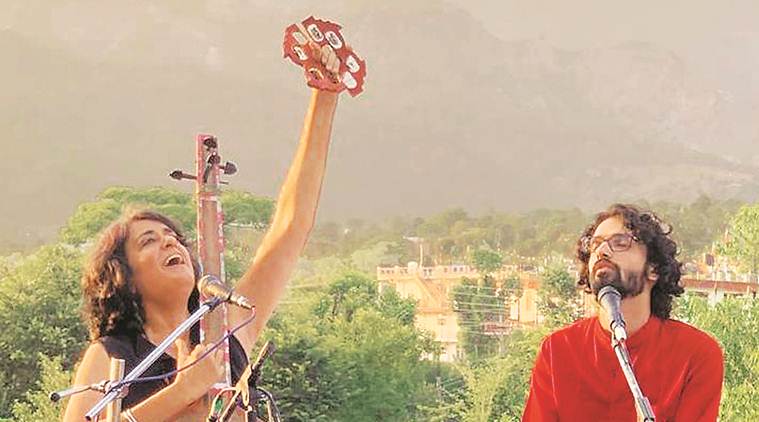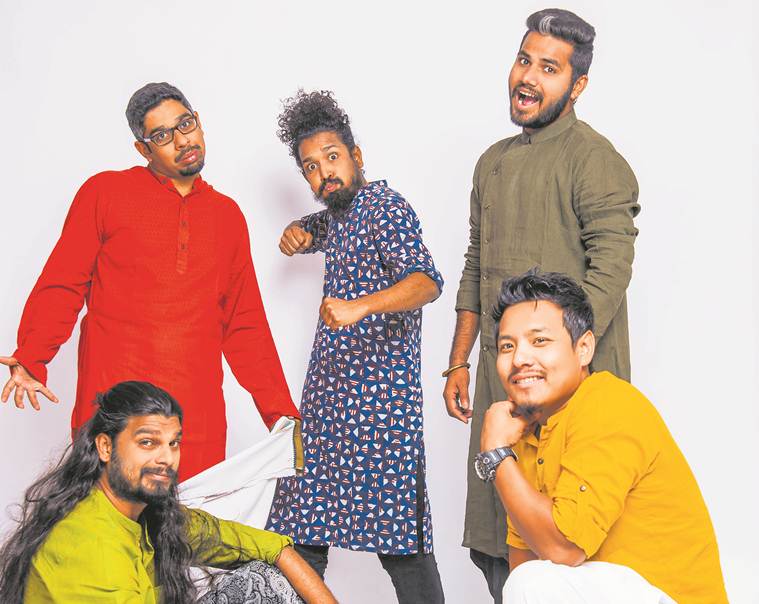Musician Shabnam Virmani on the relevance of Kabir in today’s times and why singing the 15th-century poet in Banaras is ironical.
Shabnam Virmani turned to Kabir post the Godhra riots in 2002. It was a tipping point to start an investigation that was building up for several years. “Godhra crystallised my lack of understanding of what faith means to people. Faith can put you on the rails and derail you,” says Bengaluru-based Virmani, who was looking for something in the realm of beauty and not just the materialistic understanding of the world. Virmani, along with Swagath Shivakumar, performed at the recently concluded Mahindra Kabira Festival, presented by Teamworks. The festival also had performances by flautist Ajay Prasanna, sarangi exponent Ut Kamal Sabri, a session by Kabir expert Purushottam Aggarwal and Neeraj Arya’s Kabir Cafe, among others. Excerpts from an interview:
Your performance at the festival is titled ‘Ye toh ghar hai prem ka – Love in the times of Hate’. What is the significance of Kabir and his 15th century poetry in today’s times?
We are passing through a moment in the political history of India where people are compelled to retreat into their paranoid self. Hate is only an expression when you have retreated into a place of fear in your heart. People are feeling very insecure, so the easiest thing is to take it out on people you percieve as different, leading to polarisation. It takes far more courage and character to love those different from us. And that is where the message of Kabir becomes significant. It’s a monumental hypocrisy for people to do bhajan and satsang of Kabir and hold the kind of view where they other people.
The festival, as its backdrop, had Banaras, where people come to die, and where Kabir grew up. How do you see the relationship between Kabir and Banaras?
Banaras is a citadel of paakhand (hypocrisy) that way. If I look at it cynically through the gaze of Kabir who lived there, he is not celebrating Varanasi. He is poking fun at the city, the pandits of the city, telling them they are missing the whole point. He actually rejected Varanasi and went to Maghar to die, to prove to the world that all that arrogance about being in the holiest city of the world is nothing if you cannot have compassion for those around you. I feel it’s a piquent irony that the festival is also celebrating the city, while Kabir interrogated the spirit the city.
You started out as a journalist and then picked up the camera, followed by the tambura. Talk a bit about the presence of music in your life.
My father was very fond of music and used to sing himself. I lost him when I was 11, but that tryst with music through him was very deep. We used to sing Hindi film songs and ghazals together. He had got me a harmonium and got me to learn a bit of classical music. I learned a bit more in college from a disciple of Kumar Gandharva.
Your film on Kabir, Had Anhad, was branded anti-Hindu and anti-Muslim while you were called anti-national.
The film is only anti-orthodoxy. And that is why it riles certain people from both sides of the spectrum. In fact thanks to that film, I am on a blacklist for a visa to Pakistan. They call it anti-Pakistan. When I showed the film in Godhra, they hated the film. They percieved it as an anti-Hindu and an anti-national film. A woman once said to me after the screening, “Andho ki nagri mein aaina bechna mushkil hota hai’.
You began by propagating Kabir. Did it change the way you perceived yourself?
Completely — from a very outer gaze to an inward one and to see the two as connected. From the beginning, it was a very personal journey.
Verse by Verse
Folk fusion band, Neeraj Arya’s Kabir Café was also part of the festival. For the past six years, the band has been performing Kabir’s verses, adapting their own style to their art. Raman Iyer, who plays the mandolin, says performing in Kabir’s birthplace sweetens the deal. “Banaras has an aura about it. The first time we performed here, we were quite nervous but we have now learnt to embrace the experience,” he says.
The band has Arya on lead vocals and rhythm guitar, Iyer on mandolin, Mukund Ramaswamy on violin, Viren Solanki on percussions, and Poubuanpou Britto KC on bass guitar. Iyer says, “We have all been introduced to Kabir in our school textbooks. However, growing up, I would listen to a lot of his verses on cassette. We did not know how far we’d go when we came together.” By Parth Khatau
Source: Read Full Article



